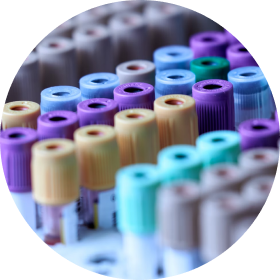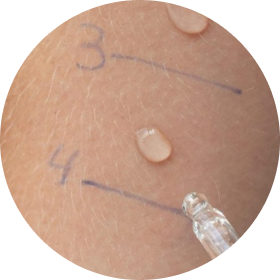NEXT UP
Diagnostic Elimination Dietand Food Reintroduction/Challenge

The only true method is the Oral Food Challenge (OFC) or elimination diet followed by food challenge – which can provide a conclusive diagnosis. The elimination diet followed by food challenge is therefore considered the gold standard diagnostic test recommended by experts.
The specific IgE (sIgE) test is used detect IgE-mediated allergy – it looks at the level of IgE antibodies to a specific allergen in the blood sample of the child e.g., cow's milk sIgE.
A sample of blood is taken, and the level of antibodies is measured (kUA/L) - a level of ≥ 0.35 kUA/L is considered positive and anything 0.35kUA/L is considered negative.1 Results can take a few days – so this method is slower than using the Skin Prick Test (SPT) method.
This test can be useful for those who cannot undergo an SPT (e.g., those with severely damaged skin).1
Predictive values or cut-offs have also been proposed for sIgE associated with higher specificity for some foods, such as for milk.2
The SPT is used to detect IgE-mediated allergy – it looks at the level of IgE to a specific allergen in skin e.g., milk protein. Marks are placed on the skin and a drop of the allergen is placed next to each mark. A lancet is used to gently prick the food (fresh or commercial extract) into the skin's surface – it should barely penetrate the skin.1
If allergic, the skin will show signs, developing a raised, red, itchy bump (called weal or wheal) after about 15-20 minutes - it may look like a mosquito bite.1
The larger the weal size the higher the chance of sensitivity to the allergen. A weal of ≥3mm is considered positive and 3mm negative. When the weal is negative to an allergen the chance of being allergic to that food allergen is considered very low.3 A weal of >3mm is considered positive and increases the likelihood of allergy to that food.
Predictive values or cut-offs have also been proposed for the SPT which were developed to eliminate the need for an Oral Food Challenge (OFC) in the clinical setting for some children, and for some foods such as milk and eggs.4-6 These cut-offs are valuable in situations where performing an OFC is impractical and/or too costly. However, most guidelines still suggest that the OFC is the gold standard for the majority of cases.

Serum Specifc |

Skin Prick Test (SPT) |
GOLD STANDARD

Diagnostic Elimination Diet and Food Reintroduction/Challenge |
|
|---|---|---|---|
| IgE-mediated CMPA | |||
| non-IgE-mediated CMPA | |||
| LEARN MORE |